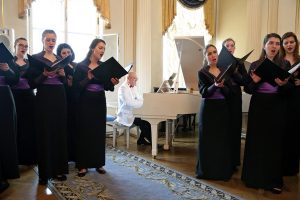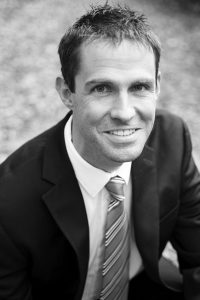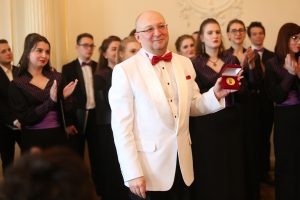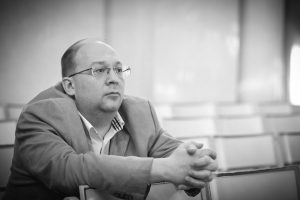Kevin L. Coker, choral conductor and teacher
Kevin Coker: What are some of your musical influences, and how have they shaped your development as a composer?
Sergey Yekimov: Probably all of us composers are essentially the disciples of the great Bach anyway… And even those who say that he had no influence on them are either dissembling or mistaken… Bach’s talent and caliber was so great that we are all indirectly his followers. However, composers of the Polish school such as Lutoslawskiu and Penderecky and outstanding composers of the former USSR like Schnittke, Shchedrin, Pärt, and Kancheli played a huge role in my compositional development. I also was fond of and researched the creative work of Ligeti, Messiaen and, of course, the composers of our St. Petersburg school, rooted in the outstanding Shostakovich.
As everyone knows, there are only seven notes. In principle, all music already has been written long ago and the composer’s technique of writing is constantly replicated. That’s when the real composer’s talent must take over. By using his own ways of musical expression, he has to attract people’s attention and make his music performed and heard. Then it will be his OWN unique and recognizable approach, style and handwriting.
What are some distinctive characteristics of your choral works?How have these characteristics changed or developed over the years?
Above all, it is polyphony. Unfortunately, not all the choirs (if we are now talking about choral music) can perform my pieces. I often use pointillism and aleatory techniques. Not often do I use serial techniques. I make sure that melody (no matter how intricate it might be) does not get lost behind modern ways of choral writing. And of course-the text (the word). Although my writing now, probably, has become more transparent and simple in comparison with the opuses of my youth. I have become more selective towards splitting texture or increasing the number of vocal divisi, and more aware of rhythmic and melodic complexity. Perhaps, I have begun to think more about the performers – they all have to sing it! I came to the conclusion long ago that nothing is more effective than instrumental sound of the choir. When the chorus sounds like an orchestra – it’s cool! (And, by the way, vice versa!).
Can you provide some insight on your approach for engaging and writing for the voice?
Due to the nature of my musical education, most of my music is either choral or chamber vocal. I graduated from college and conservatory and from graduate school as a choir conductor, and only then as a composer. I sang in different choirs and ensembles for more than 20 years. Hence my profound knowledge of the voice as an instrument. I hold vocal and choral music as my dearest and closest thing.
What are the most challenging and enjoyable aspects to your creative process?
I’m conservative in the way I write my score. I prefer, as great people did before me, to copy them by hand and not to type or compose on the computer. This does not mean I disrespect computer technologies, but do you agree that Mozart, Brahms, and Tchaikovsky did not have computers yet and they somehow managed without them! Don’t you agree? So for me, the most difficult and time-consuming task is rewriting the work to make a final draft. Although this takes time, I still consider rewriting to be an integral part in the creation of any composition. After all, while rewriting, you sing all vertical and horizontal lines, verify each voice movements, and sometimes even make important changes. The most pleasant thing is when the score has just been copied by hand, you show it to someone for the first time, and hear their initial reaction! It is exciting, momentous, but very curious…
How does it feel to hear your music performed for the first time?
It is always a big worry – the worry about the performers and how will they cope. It is also very important that the immense preparations for the premiere performance weren’t in vain. But will audience like it – it is always difficult to predict. Sometimes, compositions are obviously programmed for success, but commonly it is impossible to anticipate the reaction of audience.
And how pleasant when your composition is enthusiastically accepted by audience, but you thought that you hadn’t written anything great. It is so pleasant, nothing to hide.
Of all the pieces you’ve written, which one is your favorite, and why?
I love the composing process itself and, frankly speaking, almost every work is like a child. First you hatch an idea, then you start to create it. This process can be quick and easy, or it can be complicated and time-consuming. At the same time, the process is always insanely fascinating and takes a lot of effort, energy, attention, and time. And how glad and happy you are when you finally get everything right! There are times that the tastes of the public, and sometimes of the performers, do not agree with the opinion of the author. Sometimes it happens that the work you wrote, without even attaching much importance to it, becomes the most popular one in the long run and will be your calling card for your whole life. On the contrary, it occurs that a piece you spent a significant amount of time writing and thoughtfully repeating and polishing every note does not attract special attention and is not performed as often as you would prefer.
This happened to me as well in 1993, while I was a first-year student of the choral conducting department of the St. Petersburg Conservatory. I composed a chorale that was about one minute forty seconds in length with the amusing title “Kangaroo.” The text, which has no connection to the Australian animal, is based on the lyrics of the early 20th-century Russian poet Nikolay Gumilev. For almost a quarter of a century, this has been my most popular and most frequently performed work.

What are your current compositional projects? Are there any specific genres or works you want to write in the future?
Currently, I compose a lot in the genre of Russian orthodox sacred music. This is not only because the long-standing prohibition on creating sacred music in Russia was lifted but because I felt a sincere need to compose from my heart. At the end of 2016, a significant event happened in my life. I adopted Orthodoxy in spite of being a Catholic since I was 19 years old. Perhaps, this is why I have composed a lot of music in Latin.
However, throughout my career I have occasionally been drawn to the orthodox sacred texts, psalms and prayers. One of my earliest works was “Bless the Lord, my soul” (1992).
In 2014, the Saint Petersburg Church of the Resurrection gave a beautiful premier performance of my biggest composition to date “The Speech of the Lord.” This work for chorus and bells is nearly an hour and a half in length and the Church of the Ressurrection was a beautiful accoustic for the premier. I’ve just completed a large work “From the Akathist to Saint Faithful Prince Alexander Nevsky.” For future works and projects, I have an idea to create spiritual concerts for St. Sergius of Radonezh and St. Blessed Xenia of St. Petersburg. In addition, as a tribute to my catholic past, I would like to compose a Te Deum and Requiem. I would also like to write a large oratorio St. Mark Passion for soloists, several choirs and orchestra, and I even have an idea of creating an opera…
What role, if any, does the commissioning process currently play in your career?
The commissioning process is simply necessary for a composer. Firstly, it tests your craftsmanship as many times it is necessary to write quickly enough for the performers who have commissioned the work. And they are not always the performers who you are accustomed to or who you find convenient! Secondly, commissioned music is a job for which you get paid. And, truth be told, it is also important for any composer! However, I try to be as creative as possible even when working on ordered pieces, and work on such compositions is no less exciting or professional. Subsequently, I even sometimes forget that this or that piece was originally ordered by someone.
You are also an accomplished conductor. How has your career as a composer prepared you for conducting?
Rather vice versa! My conducting work and singing activity in chorus led to the desire to compose by myself. I repeatedly performed most of my early opuses as part of the Saint-Petersburg Youth Chamber Choir conducted by talented choirmaster Yulia Hutoretskaya. Thanks to this experience, I was able to hear high quality performances of my new compositions practically instantly. For this I am even now sincerely thankful to her. By the way, I don’t like much to interpret my own compositions – there is never enough time to execute perfectly the ideal sounds inside of me.
What insights can you offer about conducting and interpreting your music?
Probably the same as for the performance of any music! I will answer as a conductor, not a composer. For me the criteria (even when I perform my own music) are the same. I look at it as simply a composer’s creation. As such, it is necessary to take all of the composer’s wishes into account by performing the piece with accurate rhythm, intonation, tempos and in the necessary character indicated by the author. These are the keys to the success of correct and competent interpretation.
Your choirs have won international competitions and your compositions are performed throughout Russia and abroad. With all of your success, what continues to inspire and motivate you?
Love.
I should like to extend my most sincere gratitude to Sergey Yekimov for giving so generously of his time. In addition, I would also like to thank Julia Blinova for making this interview possible by translating between Sergey and I.
Pater Noster by Sergey Yekimov

Kevin L. Coker is the director of the University of Cincinnati Men’s Chorus and is completing a DMA in Choral Conducting at UC’s College-Conservatory of Music. Kevin has 10 years of public school teaching experience and has taught at the elementary, middle, and high school levels. Ensembles under his direction have received invitations to perform at state NAfMe and regional ACDA conferences. Most recently, the UC Men’s Chorus will perform at the Intercollegiate Men’s Choruses National Seminar in Washington, D.C. He holds a Bachelor of Music Education from Belmont University and a Master of Music in Choral Conducting from Florida State University. Kevin lives in Cincinnati, OH with his beautiful wife, Becky and their two golden retrievers, Cody and Abby. Email: cokerkl@mail.uc.edu



